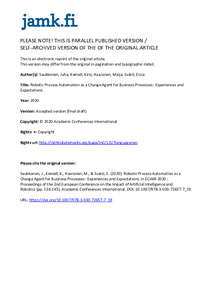Robotic process automation as a change agent for business processes: experiences and expectations
Saukkonen, Juha; Kemell, Kirsi; Haaranen, Maija; Svärd, Erica (2020)
Saukkonen, Juha
Kemell, Kirsi
Haaranen, Maija
Svärd, Erica
Editoija
Matos, Florinda
Academic conferences international
2020
All rights reserved. This publication is copyrighted. You may download, display and print it for Your own personal use. Commercial use is prohibited.
Julkaisun pysyvä osoite on
https://urn.fi/URN:NBN:fi-fe2021102051703
https://urn.fi/URN:NBN:fi-fe2021102051703
Tiivistelmä
Abstract: Robotic Process Automation (RPA) is a technology area that has quickly become part of business processes both in public administration as well as in corporations. The expectations for RPA lie in its potential to shift routine work to robotic applications and thus free resources within company functions for more strategic and development-focused work. The development pace for RPA applications and usage has “outspeeded” academic research of and education on RPA. As a response, various academic institutions have established RPA study units to their degree studies and/or special study packages (advanced diplomas) to respond to the market demand for RPA capabilities. The paper studies the experiences and expectations that participants of the RPA education i.e. early adopters set for the RPA as a technology, its perceived applicability generally and specifically to their field of work. The paper aims at discussing how the theoretical models of technology acceptance and utility fit into the phenomenon under study and addresses the enablers and obstacles for this area of robotic technology on the pragmatic level. The paper uses quantitative survey-based data collection and as an early step on the research field, sheds light on the phenomenon by descriptive statistics. The findings are assumed to inform further research on the issue and thus contribute into framework building in the academic fields of business process management and robotics.
